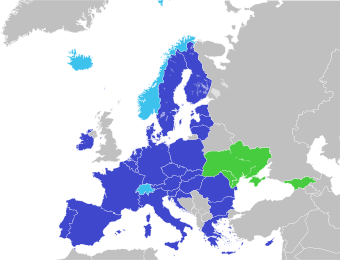
Back اتفاق التبادل الحر الشامل والمعمق Arabic Hluboká a komplexní zóna volného obchodu Czech Vertiefte und umfassende Freihandelszone German Sügav ja terviklik vabakaubanduspiirkond Estonian Accord de libre-échange complet et approfondi French Zona Perdagangan Bebas Mendalam dan Komprehensif ID Accordo di libero scambio globale e approfondito Italian Dziļās un aptverošās brīvās tirdzniecības zona Latvian/Lettish Углублённая и всеобъемлющая зона свободной торговли Russian Поглиблена і всеохопна зона вільної торгівлі Ukrainian

The Deep and Comprehensive Free Trade Areas (DCFTA) are three free trade areas established between the European Union, and Georgia, Moldova, and Ukraine respectively. The DCFTAs are part of each country's EU Association Agreement. They allow Georgia, Moldova, and Ukraine access to the European Single Market in selected sectors and grant EU investors in those sectors the same regulatory environment in the associated country as in the EU.[1] The agreements with Moldova and Georgia have been ratified and officially entered into force in July 2016, although parts of them were already provisionally applied. The agreement with Ukraine was provisionally applied since 1 January 2016 and formally entered into force on 1 September 2017.
Unlike standard free trade areas, the DCFTA is aimed to offer the associated country the "four freedoms" of the EU Single Market: free movement of goods, services, capital, and people. Movement of people however, is in form of visa-free regime for short stay travel, while movement of workers remains within the remit of the EU Member States.[2] The DCFTA is an "example of the integration of a Non-EEA-Member into the EU Single Market".[1]
The European Parliament passed a resolution in 2014 stating that "pursuant to Article 49 of the Treaty on European Union, Georgia, Moldova and Ukraine - like any other European state - have a European perspective and may apply to become members of the Union provided that they adhere to the principles of democracy, respect fundamental freedoms and human and minority rights and ensure the rule of law", thus formally recognizing the possibility of a future EU membership of the three countries.[3]
- ^ a b Cite error: The named reference
DCFTA Ukrwas invoked but never defined (see the help page). - ^ http://eeas.europa.eu/archives/delegations/ukraine/documents/virtual_library/vademecum_en.pdf [bare URL PDF]
- ^ "European Parliament resolution of 17 July 2014 on Ukraine (2014/2717(RSP))". European Parliament. 2014-07-17. Retrieved 2015-07-20.
pursuant to Article 49 of the Treaty on European Union, Georgia, Moldova and Ukraine – like any other European state - have a European perspective and may apply to become members of the Union provided that they adhere to the principles of democracy, respect fundamental freedoms and human and minority rights and ensure the rule of law;
© MMXXIII Rich X Search. We shall prevail. All rights reserved. Rich X Search